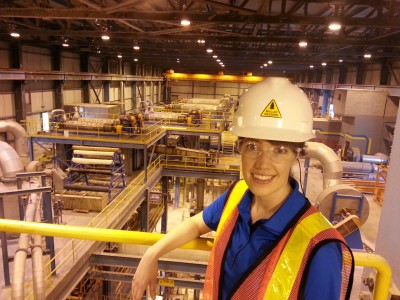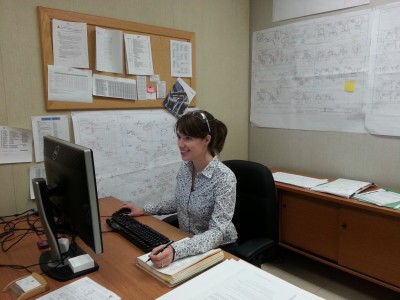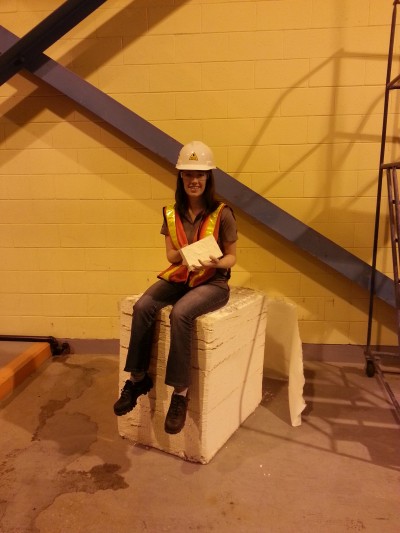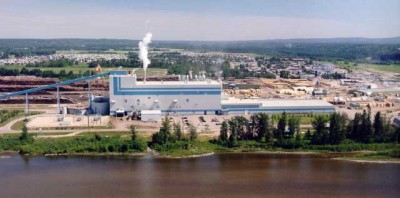Attention Science Geeks: The forest industry has loads of jobs for those of us who love science, but although the forest is full of life that must be cared for, this industry is not just about biology. If chemistry is more your thing, you may want to consider a career in chemical engineering. Meet Colleen Mireau, a Chemical Process Engineer:

1. Tell me about your job. Who do you work for? What is your role in the organization?
I am a Process Engineer-in-Training for the Millar Western Forest Products pulp mill. The role of a process engineer includes problem solving and innovation for the mill. I assist the operators in the mill with daily issues such as reducing chemical usage or fixing errors in the control system (the computers that run the mill). A larger part of my job is providing long-term solutions (called projects) through innovation like reducing energy, or improving the cleanliness of used water for re-use in the mill. These projects bring all the different departments of the mill and external companies together (mechanical, electrical, operations, engineering) to create the best solution. They range from small improvements like installing small filters to large-scale changes like creating design standards for our control system.
2. Why are chemical/process engineers important to the forest industry?
The pulp and paper industry is a highly technical and highly innovative industry. While every worker in a mill has the ability to problem solve and innovate, the special skill that I have as a chemical engineer is the understanding of how substances interact in the pipes of the mill. This comes in handy when trying to make new grades (types) of pulp or installing new equipment. Engineers are often responsible for helping different departments of the mill communicate with each other.
3. What is your background (experience/training)? What made you decide to take this career path?
My training was a Bachelor of Science in Chemical Engineering from the University of Alberta. I initially decided to try engineering because it was one of the hardest undergraduate programs to enter into. My hope was that if I didn’t like engineering that it would be easier to switch into another program. However, once I started my first year at university I found that I loved Engineering. As an Engineering student I was able to dabble in the all the major sciences (bio, chem, physics) and learn some math, which is more fun than a pure math or science degree. My courses were all a little bit practical which meant that every course was a building block to my eventual career.
In my final years of university, I started to wonder where I would like to work. The experiences I gained through co-op were crucial to my decision to work in a pulp mill. I found that I enjoyed problem solving where the action was happening and working with equipment rather than designing new stuff. I would recommend that anyone in any field try a co-op or a practicum. It gives you the best feel for the job.
4. What does a typical day/week look like for you?
I usually work from 7:30am to 5:00pm, Monday to Friday. Most mornings, I attend a Production Meeting to review and discuss the mill’s prior day—and after that daily meeting, every day is completely different. I spend about 25% of my time in the mill and about 75% in the office. Most days I complete many calculations within my work, whether processing large amounts of mill information (flows, temperatures, pressures) or reviewing equipment information.

5. What aspects of your job do you enjoy the most?
People have the greatest impact on a person’s day, and at Millar Western, we have a great group of people working together to run our pulp mill. I also love challenges. Every day I get to stretch and grow my brain. Some days I leave with a headache because of too much stretching, but I am rarely bored.
6. What are some of the challenges that you have faced?
Like I mentioned before, the pulp and paper industry is highly technical and highly innovative. That means that there is a steep learning curve which tends to continue as technologies are ever-changing. Many of the people employed in the pulp and paper industry have been around for a long time, so you always have a feeling that you are little bit behind in your knowledge. However, the great thing is that there are many willing and able teachers ready to help you learn.
7. Can you give an example of a time when your work significantly impacted your organization?
I like to think that the work I do to promote the forest industry and engineering with students helps our organization. I have done tours for student groups, school presentations and recently was involved in a Forestry Industry Career Day to encourage students to consider forestry careers for the high schools in our area.
On a more practical side, I worked with the Millar Western team to produce a specialty pulp for one of our customers who was thinking that they might have had to switch to another supplier. Our engineering process group designed the solution and implemented the equipment to create the new product. We kept the customer and in fact increased their demand for our specialty pulp. Since then, the customer has asked us to create more specialty products for them.
At the mill, I am probably most notorious for re-designing our Management of Change (MOC) process. It was a big project to improve the mill. While it was not the most exciting project, it is already making a big difference in how the mill operates. For example, it will ensure that spare parts are purchased when a new item is installed, rather than the first time that we have an emergency with that piece of equipment.

8. What qualities make up an ideal candidate for a chemical engineer?
Anyone who is interested in the practicalities of science and math will enjoy the problem solving I have to do. To be successful in pulp and paper, you must be someone who enjoys working with others and getting your hands a little dirty.
9. What are some of your favourite aspects of the forest industry?
I love the places that you get to live. I was born and raised in a forestry town and I found my way back because I love living within nature. I love having the wild right outside my door. I also enjoy working in such a renewable industry. It is a truly “green” place to work.

10. Additional comments?
I always encourage people to come visit me at work because the best way to figure out if you want to work in an industry is to visit that industry and see what a person in your ideal career does. Feed your curiosity and get out there!
If this career path interests you, our Engineering Career List is a great resource to learn more about Chemical Engineering jobs.